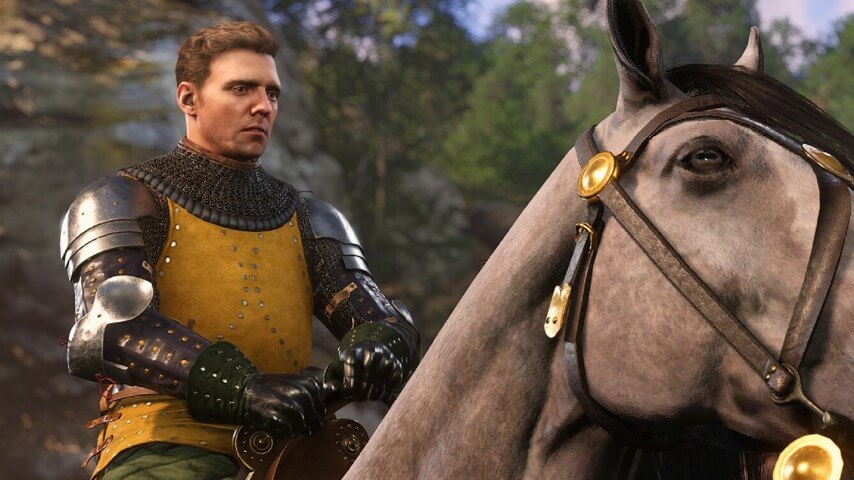We’ve reached that bit of every year that gaming writers dread—the point where the momentum of a growing backlog of un-played games, and the looming glacier of oncoming Game Of The Year considerations, threaten to collide into one big, shark-strewn shipwreck of people screaming “Wait, you didn’t even play [insert 90-hour first-person base-building sim that doesn’t really take off until hour 89 here]?!” in the comments. Sometimes, efforts to patch holes in the ship of what a small group of writers can play in a year can be fruitful—last year, I raced to finish Sunset Visitor’s 1000xResist ahead of finalizing our GOTY list, and was rewarded with one of the most moving and powerful game stories I’ve encountered in years. Sometimes, though, you just end up spending 20 hours with Kingdom Come: Deliverance II, perhaps the most expansive and deliberately obtuse idle game I’ve ever played.
And, look: I get that there are people for whom Deliverance II, which I could less reductively describe as a “many-featured shit-strewn peasant simulator,” is exactly what they’re seeking from gaming. Set in 15th-century Bohemia, it’s the kind of game that cares deeply whether you’ve got your gambeson on under or over your pauldrons, and there’s something undeniably compelling about how detailed and gritty it all is. (My idle game sarcasm mostly comes from the multiple hours I spent brewing up potions in an effort to alchemize my version of game protagonist Henry out of poverty, carefully meting out harvested ingredients and flipping timers to insure that my philters had reached the proper level of boil, before selling them to a local alchemist who cheerfully paid my pennies on the dollar for my work.) There’s a certain itch that gets scratched by a game that seems bound and determined to account for every single ounce of lice-ridden minutiae in medieval life, while also being rigorous about forcing the player to live with the many, many failures they will accrue while trying to stay alive amidst all these damn peasants, nobles, and raging Cumans.
I’m not immune to this: An early encounter on the road to a slightly-less-hellish hellish backwater than the one you start the game in saw me run into a truly horrible, nigh-insurmountable challenge: Two guys who wanted to kill me. (One of them in armor!) The desperation of trying to fight off attacks from two directions at once, managing the timing-based rhythm of the game’s swordfighting, landed just on the right side of the intricacy/tedium divide, and the battle had me breathing heavy by its end. When I finally prevailed—looting the armor myself, natch—I had an exhausted Henry chow down on a plate of cooked meat in my inventory to celebrate. The game dutifully informed me that I’d contracted food poisoning, and was now in imminent nature of death.
In that moment, the whole future course of my time with Deliverance II stretched out in front of my mind’s eye. Yes, there are systems to master here, and I’ve got the kind of gaming brain that loves to master a good system. At the same time, though: I’m 41. However you slice it, I’ve only got so much time left on this muddy little orb, and I had to have a frank conversation with myself about how much of it I was willing to spend clicking five pages deep in menus to ensure that I’m not about to give a fictional Czech a raging case of sausage-based diarrhea. It doesn’t help that, beyond the mechanical pleasures of keeping this chump alive, Deliverance II offered me almost nothing in the way of more philosophical hooks to maintain interest: The setting is unique, admittedly, but the characters seem to have been drawn from a sort of Game Of Thrones-lite template, the kind that seems to be mostly concerned with the amusement that comes when old-timey folks say “fuck.” (Also, finally: A game that interrogates whether revenge is good!) I’m sure there’s interesting storytelling in here somewhere—the game’s clearly massive enough to contain multitudes—but the question became “How much more Medieval Food Safety Inspector am I willing to play to get to it?” As-is, the game can’t even necessarily compete on the “pleasant tedium” scale, for as much as I kind of enjoyed just walking around its meadows, picking flowers; PowerWash Simulator 2 just came out, and nobody’s beating those folks at the “video game about accomplishing tiny, boring tasks” game.
Kingdom Come II wasn’t the only game I’ve been playing in my effort to do my due diligence on 2025: I’ve also been poking gently at Atomfall, which quickly filed itself in my brain as “S.T.A.L.K.E.R. but with Northern England accents.” Which is, again, reductive, but these second-chance passes have to be reductive, as a matter of necessity. Both games have certainly served as a strong reinforcement of my thoughts on why the opening hours of a video game are so incredibly important: Whatever your hook is, whatever makes your game interesting and unique once players are 40 hours into its basic loops, it’s got to be in evidence in some form from the start. The damn things are just too massive to fully appreciate otherwise.
I liked Atomfall a bit more than Kingdom Come, as it happens—its version of hostility toward the player felt more compelling, and it never even tried to make me think the word pauldron—but it feels like another game that will end up slipping away from me, gliding away into the morass of 2025 also-rans. There are, after all, always more games coming. (I haven’t even scratched the surface of Pokémon Legends: Z-A, and roguelite beat-em-up Absolum is continuing to eat up big chunks of my time.) You simply can’t play everything—not that I won’t break my brain in half while making a good-faith try.

 Keep scrolling for more great stories.
Keep scrolling for more great stories.
